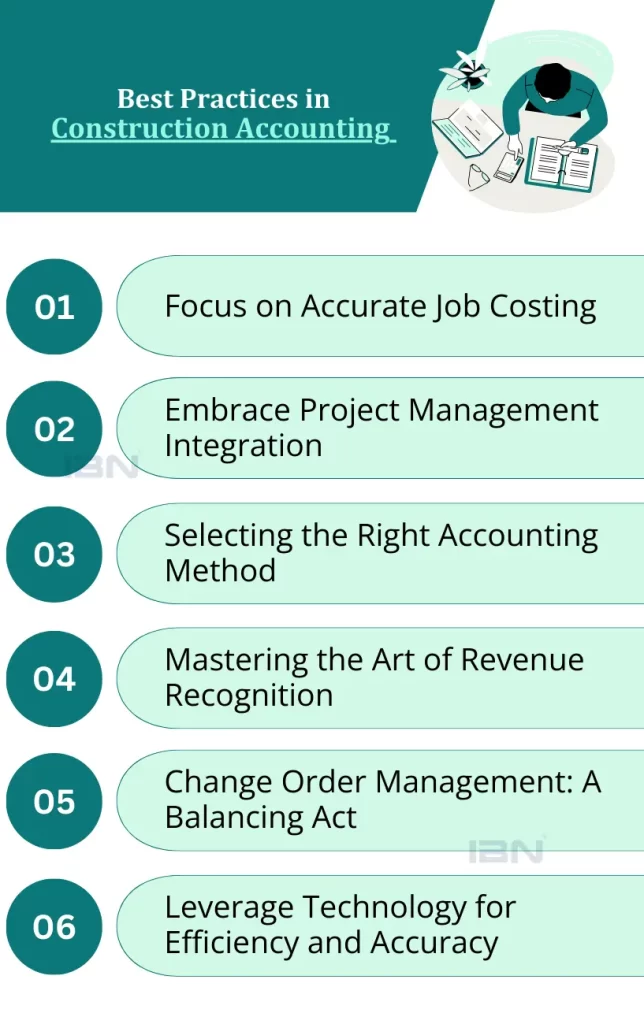How Construction Accounting Can Save You Time and Money on Your Next Project
How Construction Accounting Can Save You Time and Money on Your Next Project
Blog Article
Understanding the Importance of Building Accounting for Successful Project Monitoring

Duty of Building And Construction Accountancy
Building bookkeeping works as the foundation of financial management in the construction market, ensuring that tasks are completed within budget plan and economic purposes are met. construction accounting. This specialized accounting method addresses the unique challenges faced in building jobs, including differing job periods, varying costs, and several stakeholders
One of the primary roles of building and construction accounting is to supply precise price estimation and monitoring throughout the project lifecycle. This facilitates enlightened decision-making, making it possible for job supervisors to readjust timelines and resources properly. Furthermore, construction accountancy enhances money flow administration by checking accounts receivable and payable, thus ensuring that funds are available for prompt payments to subcontractors and distributors.
It furnishes task managers with the essential monetary data to prepare comprehensive monetary declarations, which are essential for audits and financial evaluations. Eventually, the duty of construction accountancy extends beyond simple monetary monitoring; it is integral to strategic planning and functional effectiveness, driving the success of building tasks in an affordable landscape.
Key Elements of Building And Construction Bookkeeping

Budgeting establishes a financial structure that overviews task execution, allowing managers to allocate resources successfully and prepare for prospective financial difficulties. Exact expense tracking is important for tracking expenses in real-time, assisting to determine variations in between forecasted and real costs. This enables timely modifications to maintain the job on spending plan.
Moreover, monetary reporting offers stakeholders with a clear photo of the job's monetary health. Routine reports, such as profit and loss statements and capital evaluations, help with notified decision-making and improve openness among all celebrations involved.
In addition, compliance with industry policies and accountancy standards is essential. This guarantees that monetary practices are not only efficient but also authorized, guarding the organization versus legal repercussions. By integrating these essential components, building accountancy promotes an organized technique to managing funds, eventually adding to the effective completion of building jobs.
Advantages for Task Managers
Leveraging effective building and construction audit practices supplies task supervisors with a wide variety of advantages that boost both operational performance and monetary oversight. One considerable advantage is boosted spending plan management. Accurate monitoring of incomes and expenses enables project managers to check economic performance in real time, guaranteeing tasks stay within budget and promoting prompt modifications when needed.
Furthermore, building and construction accounting enhances capital management, making it possible for job managers to maximize and anticipate financial needs source allotment. By understanding cash money inflows and discharges, they can much better handle repayments to employees, providers, and subcontractors, consequently avoiding costly hold-ups.
Furthermore, durable accountancy systems offer comprehensive coverage abilities. Job supervisors can create reports that use understandings right into project productivity, cost differences, and source use. This data-driven method promotes informed decision-making, permitting managers to recognize prospective issues proactively and carry out restorative measures.
Finally, adherence to building and construction bookkeeping standards guarantees compliance with regulative and legal demands, lessening the risk of disagreements or charges. On the whole, effective building accountancy gears up task managers with the tools needed to drive project success, boost stakeholder confidence, and advertise long-term organizational growth.
Typical Challenges in Building Audit
Numerous project managers encounter significant obstacles in construction accountancy that can hinder job success. Among the key difficulties is the complexity of tracking multiple job websites, each with great post to read distinct budget plans, timelines, and resource appropriations. This needs meticulous interest to information, which can be frustrating without a robust bookkeeping system in position.
In addition, fluctuating product costs and labor prices can make complex spending plan administration, making accurate projecting challenging. Task supervisors often have a hard time to resolve these expenses with actual expenditures, causing possible financial discrepancies.
Moreover, building audit includes compliance with different guidelines, including tax obligation responsibilities and labor laws. Navigating these guidelines can be difficult, particularly for supervisors that might not have a strong accounting history.
An additional considerable obstacle is taking care of capital, which is important in the construction sector. Hold-ups in invoicing, repayments from clients, or unanticipated job modifications can produce cash flow shortages, threatening the job's progress.
Lastly, efficient interaction between project supervisors, accounting professionals, and field teams is crucial. Misconceptions can result in unreliable monetary coverage, even more complicating task administration initiatives. Resolving these challenges proactively is necessary for effective building audit.

Ideal Practices for Effective Bookkeeping
While navigating the complexities of building and construction audit can be challenging, embracing finest methods can considerably boost monetary monitoring and job success. One basic technique is keeping timely and hop over to here exact documents. Implementing durable audit software program tailored to construction projects can improve information entrance, invoicing, and reporting, saving and minimizing errors time.
Furthermore, establishing a clear spending plan and normal surveillance versus this budget are crucial. Utilizing a system of routine monetary testimonials enables job managers to determine variances early, helping with timely decision-making. It is also vital to different project expenses right into straight and indirect groups, making it possible for more clear understandings into productivity.
One more best practice includes fostering open interaction amongst all stakeholders. Regular updates and collective discussions concerning economic standing can make sure everyone is aligned and informed. Training personnel in construction-specific accountancy concepts further anchor boosts proficiency and accuracy.
Lastly, ensuring conformity with relevant audit standards and laws is non-negotiable. Routine audits and internal evaluations add to openness and responsibility, constructing trust with customers and stakeholders. By focusing on these best practices, building companies can enhance their accounting procedures, ultimately driving task success and monetary security.
Conclusion
Finally, building accountancy plays a crucial function in making certain effective task monitoring by assisting in exact monetary oversight and boosting decision-making. By incorporating vital elements such as cost estimation, capital management, and compliance, job supervisors can navigate common challenges and utilize finest methods for efficient accountancy. Ultimately, a durable building and construction accountancy framework not just safeguards budget plan honesty yet also contributes to the overall economic health and wellness of building jobs, fostering sustainable success within the market.
By integrating these essential elements, building accountancy fosters a structured approach to managing financial resources, inevitably adding to the successful conclusion of construction projects.
Precise monitoring of expenditures and incomes allows job supervisors to monitor economic efficiency in actual time, making certain tasks remain within budget and assisting in prompt adjustments when necessary.
Job managers can produce records that use insights into job productivity, cost variations, and source application.Many job managers run into substantial obstacles in construction audit that can impede job success. construction accounting. Eventually, a durable building and construction accountancy structure not just safeguards budget honesty however also contributes to the overall financial health of construction tasks, cultivating sustainable success within the industry
Report this page